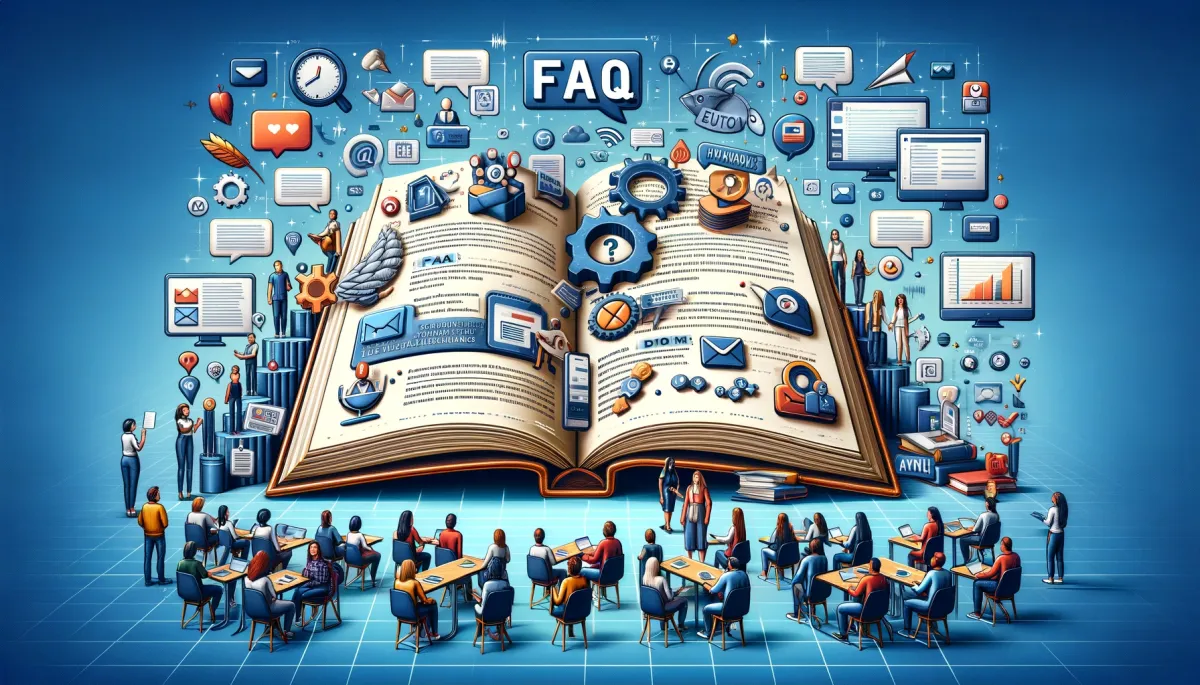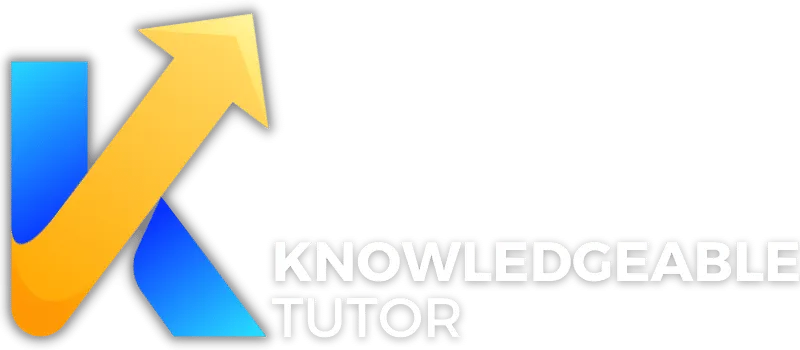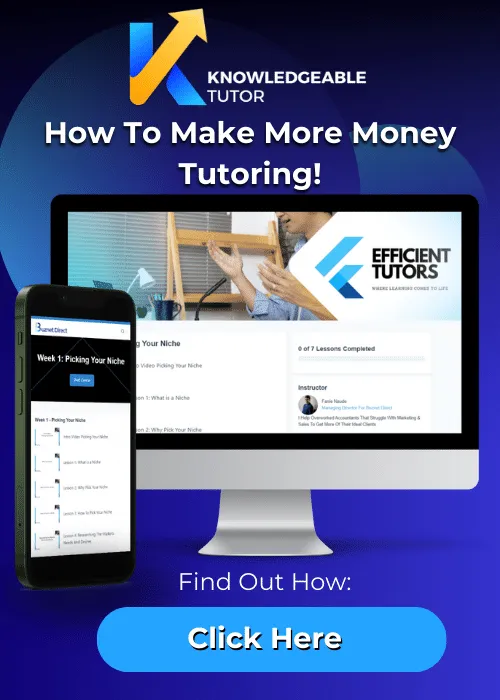Effective Email Marketing Strategies For Online Tutors

Fanie Naude
CEO & Founder of Knowledgeable Tutor, Buznet Direct, YMC & Naude Consulting

Fanie Naude
CEO & Founder of Knowledgeable Tutor, Buznet Direct, YMC & Naude Consulting
In This Article
The Imperative of Email Marketing in Online Tutoring
The Art and Science of Email List Segmentation
The Nuances of Personalization and Testing in Email Marketing
Navigating the Legal Maze and Future Trends in Email Marketing
FAQ - Addressing Common Queries on Effective Email Marketing Strategies for Online Tutors

The Imperative of Email Marketing in Online Tutoring
Why Email Marketing?
The Unwavering Relevance of Email Marketing
In an era where social media platforms are proliferating, one might wonder about the relevance of email marketing. However, let's not forget the words of David Newman, "Email has an ability many channels don't: creating valuable, personal touches—at scale." Email marketing is not just another channel; it's a direct line to your audience. According to a Market Tailor article, email marketing is a highly effective way to boost enrollment and revenue in online courses and education businesses.
The Power of Direct Communication
Email marketing allows for a more personalized, targeted approach. Unlike social media, where your message is one among thousands, an email lands directly in the recipient's inbox. This direct line of communication is your most effective way of connecting with people, as highlighted by Tutor Success Academy.
List of Benefits
- Personalization: Tailor content to individual needs.
- Cost-Effectiveness: Minimal investment for maximum reach.
- Measurable: Easy to track KPIs and ROI.
- Flexibility: Adapt campaigns based on performance data.
Choosing the Right Email Marketing Platform
Features to Consider
Selecting the right email marketing platform is akin to choosing the right vehicle for a long journey. You need reliability, performance, and comfort. Here are some features to consider:
- Ease of Use: The platform should be user-friendly.
- Automation Capabilities: Essential for scaling your efforts.
- Analytics: Comprehensive reporting tools are a must.
- Customer Support: Because you don't want to be stranded.
Table: Comparison of Popular Email Marketing Platforms
| Platform | Ease of Use | Automation | Analytics | Customer Support |
|---|---|---|---|---|
| Mailchimp | High | Yes | Advanced | 24/7 Support |
| SendinBlue | Moderate | Yes | Basic | Email Support |
| ConvertKit | High | Limited | Moderate | Live Chat |
Real-Life Example: Mailchimp for Online Tutors
Mailchimp has been a go-to platform for many online tutors. Its ease of use and robust analytics make it a favorite. Here's a case study that delves into how an online tutor increased their student engagement by 40% using Mailchimp's automation features.
Building an Email List
The Foundation of Your Campaign
Your email list is the backbone of your email marketing campaign. As LinkedIn advises, the first step is to create valuable content that showcases your expertise, personality, and teaching style to attract subscribers.
Strategies for List Building
- Content Upgrades: Offer additional resources in exchange for an email.
- Webinars: Use educational webinars as a lead magnet.
- Social Media: Leverage your social media following to grow your list.

The Art and Science of Email List Segmentation
Segmenting Your Email List
The Concept of Segmentation
In the words of Seth Godin, "Don't find customers for your products, find products for your customers." Email segmentation is the practice of dividing your email list into smaller, targeted groups to send them the most relevant information. This strategy is pivotal for online tutors who aim to cater to diverse learning needs. According to Zapier, segmentation allows you to send the most pertinent content to your audience.
Why Segmentation is Crucial
Segmentation is not just a fancy term; it's a necessity. Sending generic emails to your entire list is akin to teaching calculus to a literature class—ineffective and irrelevant. ConvertKit emphasizes that having an email segmentation strategy helps you better understand your audience's desires and create targeted content for them.
List of Segmentation Criteria
- Demographics: Age, location, and education level.
- Behavioral Traits: Past purchases, course completion, etc.
- Engagement Level: Open rates and click-through rates.
- Learning Preferences: Visual, auditory, or kinesthetic learners.
Crafting Compelling Subject Lines
The Importance of First Impressions
As the saying goes, "You never get a second chance to make a first impression." Your email subject line is that first impression. It's the gateway to your content and, therefore, should be compelling enough to prompt a click.
Strategies for Effective Subject Lines
- Curiosity: Pique interest but don't give everything away.
- Urgency: Create a sense of time sensitivity.
- Relevance: Make it pertinent to the reader's needs or pain points.
Table: Examples of Effective Subject Lines
| Type | Example Subject Line | Why It Works |
|---|---|---|
| Curiosity | "Unlock the Secret to Better Grades" | Intriguing and promises value |
| Urgency | "Last Chance to Enroll in XYZ Course" | Creates FOMO (Fear of Missing Out) |
| Relevance | "Boost Your Math Scores in 30 Days" | Addresses a specific need or challenge |
Email Content Strategies
The Heart of Your Email
The body of your email is where the magic happens. It's where you deliver on the promise made in your subject line. According to OptinMonster, segmenting your email list allows for higher conversions, which means your content needs to be equally compelling.
Types of Content to Include
- Educational Content: Tips, how-tos, and mini-lessons.
- Promotional Content: Special offers, discounts, and course launches.
- Engagement Content: Surveys, quizzes, and interactive elements.
Real-Life Example: Educational Content Boosts Engagement
An online tutor specializing in history saw a 25% increase in course enrollments after sending a series of educational emails containing mini-lessons on historical events. Here's the case study.

The Nuances of Personalization and Testing in Email Marketing
Personalization Techniques
The Essence of Personalization
"Personalization is not a trend, it's a marketing tsunami," says Avi Dan, a marketing consultant. Email personalization is not just about using the recipient's name; it's about delivering content that resonates with their specific needs and preferences. According to Neil Patel, personalization is a marketing strategy that involves customizing email content based on individual preferences, interests, and behaviors.
Why Personalization Matters
Personalization is the key to unlocking higher engagement rates and, ultimately, conversions. A CourseStorm blog suggests that email personalization can significantly boost student engagement in online education.
Techniques for Personalized Emails
- Dynamic Content: Tailor content based on user behavior.
- Behavioral Triggers: Send emails based on specific actions like course completion.
- Personalized Recommendations: Suggest courses or resources based on past behavior.
A/B Testing
The Scientific Approach
As W. Edwards Deming once said, "In God we trust; all others bring data." A/B testing is the data-driven approach to email marketing. It allows you to test different elements of your email to see what resonates most with your audience.
Importance of A/B Testing
A/B testing is not a one-time activity but an ongoing process. It helps you understand what works and what doesn't, thereby enabling you to optimize your email campaigns for better performance.
Elements to A/B Test
- Subject Lines: Test different phrasings or structures.
- Call-to-Actions (CTAs): Experiment with different colors, text, and placements.
- Content Layout: Test single-column vs. multi-column layouts.
Table: A/B Testing Metrics
| Metric | What It Measures | Ideal Range |
|---|---|---|
| Open Rate | Percentage of emails opened | 20-40% |
| Click Rate | Percentage of clicks within the email | 2-5% |
| Conversion Rate | Actions taken (e.g., course sign-up) | 1-3% |
Analyzing Email Metrics
The Numbers Don't Lie
As Peter Drucker aptly put it, "What gets measured gets managed." Monitoring key performance indicators (KPIs) is crucial for the success of your email marketing campaigns.
Key Metrics to Monitor
- Open Rate: Measures the effectiveness of your subject line.
- Click-Through Rate (CTR): Indicates the quality of your content.
- Conversion Rate: Shows the ultimate effectiveness of your email.
Real-Life Example: A/B Testing Increases Conversion
An online tutor used A/B testing to experiment with different CTAs and saw a 15% increase in course sign-ups. Here's the case study.

Navigating the Legal Maze and Future Trends in Email Marketing
Legal Aspects of Email Marketing
The Rule of Law
As the Latin maxim goes, "Ignorantia juris non excusat" (Ignorance of the law is no excuse). When it comes to email marketing, there are legal guidelines that must be followed. According to TermsFeed, the Controlling the Assault of Non-Solicited Pornography and Marketing Act (CAN-SPAM) primarily regulates email marketing in the U.S.
Key Legal Considerations
- Consent: You must have explicit permission to email someone.
- Unsubscribe Option: Every email must contain an option to unsubscribe.
- Transparency: Clearly state who you are and why you're emailing.
Table: Legal Requirements for Email Marketing
| Requirement | Description | Legal Source |
|---|---|---|
| Consent | Explicit permission to send emails | CAN-SPAM Act |
| Unsubscribe Option | An easily accessible option to opt-out | CAN-SPAM Act |
| Transparency | Clear identification of the sender and purpose | CAN-SPAM Act |
Case Studies
Allakando: Mastering Contact List Management
Allakando, an educational institution, managed to maintain a personal touch while interacting with a large audience through email marketing. Their strategy revolved around effective contact list management, which allowed them to send targeted and relevant content to their subscribers. This case study showcases the importance of list segmentation and personalized messaging in achieving high engagement rates. Read the full case study here.
Coaches and Course Creators: Generating Revenue on Autopilot
An intriguing case study on LinkedIn highlights how coaches, course creators, and info product owners can generate substantial revenue through automated email marketing. The study emphasizes the power of automation in scaling your online tutoring business. Read the full case study here.
Common Pitfalls and How to Avoid Them
Sending Generic Emails
Pitfall: Sending the same email to your entire list. Solution: Segment your list and tailor your content to each segment.
Ignoring Mobile Optimization
Pitfall: Emails that are not optimized for mobile devices. Solution: Use responsive design to ensure your emails look good on all devices.
Overlooking Legal Requirements
Pitfall: Not adhering to legal guidelines like the CAN-SPAM Act. Solution: Always get explicit consent, provide an unsubscribe option, and be transparent.
Future Trends in Email Marketing
AI-Driven Personalization
The future of email marketing is set to be revolutionized by AI and machine learning. These technologies will enable more personalized and targeted email campaigns, enhancing both engagement and conversion rates.
Voice Search Optimization
As voice-activated devices become more prevalent, optimizing your email content for voice search will become increasingly important. This will involve using natural language and question-based queries in your content.
Interactive Emails
Emails are set to become more interactive, offering features like embedded videos, quizzes, and even shopping functionalities right within the email.

FAQ - Addressing Common Queries on Effective Email Marketing Strategies for Online Tutors
Frequently Asked Questions (FAQs)
1. What is the importance of email marketing for online tutors?
Email marketing serves as a direct line of communication between you and your students or potential students. It allows for personalized, targeted messaging that can significantly boost engagement and conversions. According to a LinkedIn article, email marketing can be a potent tool for attracting students.
2. How do I choose the right email marketing platform?
The choice of platform depends on various factors such as ease of use, automation capabilities, analytics, and customer support. Platforms like Mailchimp, SendinBlue, and ConvertKit are popular choices, each with its own set of features and benefits.
3. What are some effective email marketing strategies for educational institutions?
Strategies include segmenting your email list, crafting compelling subject lines, and creating valuable content. An article by Envoke provides a comprehensive guide on email marketing for educational institutions.
4. How can I make my email marketing strategy more effective?
Effective email marketing goes beyond just sending emails. It involves understanding your audience, segmenting your email list, and personalizing content. A guide by CareerBright offers valuable insights into making your email marketing strategy more effective.
5. How can I advertise my tutoring services through email marketing?
You can use various strategies such as offering special discounts, sharing educational content, and sending personalized course recommendations. Constant Contact provides a detailed guide on how to advertise tutoring services.
6. How do I drive traffic to my online tutoring business through email marketing?
Driving traffic involves a mix of promotional and educational content. You can offer special discounts, share valuable tips, and even host webinars to attract more students. SmartyAds offers marketing tips for online tutoring businesses.
7. What are the legal aspects I should be aware of in email marketing?
Legal considerations include obtaining explicit consent to email someone, providing an unsubscribe option, and being transparent about who you are and why you're emailing. Non-compliance can result in penalties under laws like the CAN-SPAM Act.
8. What are the future trends in email marketing for online tutoring?
Future trends include AI-driven personalization, voice search optimization, and interactive emails. These advancements are set to make email marketing more effective and engaging.

